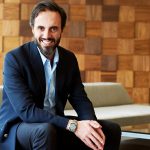Putting today’s university youth at the centre of global challenges
Getting young people to engage in projects with innovative companies, entrepreneurs and social organisations is how the youth today can shape a new world system capable of harnessing globalisation and technology to create a sustainable future says Daniel Traça Dean of Novo SBE at a dinner organised by the American Club of Lisbon.
Higher education cannot be dissociated from business and what is going on in the world. We have to understand that there is something “strange” going on and find answers to why these things are happening and find solutions for them said Daniel Traça, the Dean of Lisbon’s business and economics school Nova SBE at the Grémio Literário on Wednesday.
Traça believes that educational institutions have to think about the role we have had in creating this current crisis of pessimism in order to come up with a new system of thought and behaviour to address it.
“There is a sense of fear, despair and pessimism that pervades our liberal western capitalist societies. We have been here at other points of history (an allusion to the 1930s) and it has never ended well” he warned.
Traça says that as human beings we offer up the best when we expect the best and have hope and so we need to understand where all our fears come from to discover the solutions to help us move forward.
“As we look at Nova SBE and the other universities around the world, we need to ask what is our role and what role will we play in transforming this cycle of fear into a cycle of hope? When people expect good things, they become optimistic, they start trusting, conversing and engaging,” he said.
What’s going on?
So what has brought on this crisis of Western capitalism? There are several schools of thought. One says people are pessimistic because they don’t see the data. This school argues that we are living so much better than before with life expectancy higher than ever before in the history of mankind. This view of the world suggests that to address this pessimism we have to make people aware that the data is there and there is no reason to be pessimistic.
“I don’t buy that” says Traça. “I don’t think you can convince any human being through statistics because our brain works with stories, passion, the hope of fulfilling dreams and fantasies and sharing things with others. We’re not going to solve anything by telling people to look at charts” he said.
The other idea is that we are all following the wrong ideologies. That we abandoned a very successful model in the 1950s and 1960s and became sold on liberal ideas and If we just got rid of our liberal world, the world would be exactly the way it was in the 1950s and 1960s when there was hope and optimism.
“I fundamentally disagree. There’s a reason we voted that system out of office and so returning to the past and believing the future needs to be about going back to the past is also fundamentally problematic” the economist said.
The way F — universities
Daniel Traça believes that in essence our system is not facing fundamental shocks which need new solutions.
The Dean says that we need to reimagine our society, come up with new ways for our society to function and the major players in heralding in this new society have to be universities.
“I think this because universities are where young people who are most likely to look at the future are concentrated. They are the most likely to look at the future. Universities have always been created to think about the future on an academic level and bring in new solutions for problems” said Daniel Traça.
Universities have to take on this responsibility because they provide the most fertile ground where different factions can be brought together: politicians, unions, companies and social organisations. Universities can serve as a hub where these people feel more comfortable, creating coalitions where they can imagine new solutions.
“The fundamental opportunity for universities today is to regain that space that we once occupied by actually creating an open space where everybody feels welcome, leveraging our students to come up with new and interesting ideas and solutions. Our project as a school is to use the campus in Carcavelos that we built to actually create this environment by revisiting and reinventing the mission that universities have” said Traça.
Globalisation, technology and sustainability
Daniel Traça says that there are three things changing the world. The first, ‘Globalisation’ with the challenge of how state capitalism and market capitalism can be brought together and global institutions can be reimagined.
The second, ‘Technology’ and the idea that the fourth industrial revolution is already here and digital data is permeating everything that we do. “We need to take advantage of that technology to transform society and not allow that technology to submerge us” he says.
The third, ‘Sustainability’ and if we can actually save the world from climate change and preserve it through a sustainable lifestyle.
“What we are living today is the idea that our system, that was not designed to cope with massive globalisation, technological change and challenges over sustainability is now facing them and our institutions that we created in the 20th century are just not ready to cope with these challenges” said Traça.
“Can we redesign and reimagine our institutions in ways that help is to rethink a new world where we can come back to optimism and share distribution?” he adds.
The Nova SBE Dean says his institution is working on this challenge on three levels. Globalisation, technology and sustainability will require new skills, new companies and institutions and organisations.
And what are these new skills? They are ‘Innovation,’ ‘Collaboration’ and ‘Courage’. Traça stressed that in this world of technology, the kind of skills that companies are looking for are increasingly human ones.
“By courage, I mean taking decisions quickly, taking risks and accepting to live with the consequences. For technology you need very fast innovation, while organisations need people that don’t take forever to make decisions, but are quick and agile” he explained.
“I cannot teach young people this and I cannot certify these skills. At the same time we need people that are so good with technology that they treat it as a second arm because it will very quickly become a commodity” he adds.
But how are we going to deliver the human skills? Traça freely admits that knowledge will be changing constantly, and what they are teaching today may well be out of date within five or six years. “We need to develop skills to learn, unlearn and to learn again” he says.
He asked, “Can we actually create systems that help students acquire these skills, to keep on learning throughout their lives and have faculties that actually do this?”
At Nova SBE he is trying to create systems where a lot of the learning takes place out of the classroom, in interactional spaces. “If we throw entrepreneurship at them and they are forced to lead projects, they will acquire skills by engaging in these and if we can find a way of certifying the fact that these young people have run all these projects through collaboration, creativity and decision making, then we are ahead of the game” said Daniel Traça.
How do we do this?
By working with innovative companies, entrepreneurs, social organisations and entire communities Daniel Traça believes that they will be able to teach young people these skills. “This is what we’re doing and what all universities should be doing,” he concluded.










